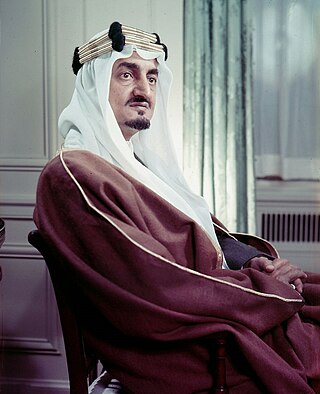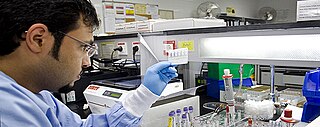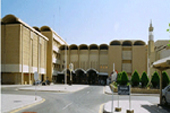
Faisal bin Abdulaziz Al Saud was a Saudi Arabian statesman and diplomat who was King of Saudi Arabia from 2 November 1964 until his assassination in 1975. Prior to his ascension, he served as Crown Prince of Saudi Arabia from 9 November 1953 to 2 November 1964, and he was briefly regent to his half-brother King Saud in 1964. He was prime minister from 1954 to 1960 and from 1962 to 1975. Faisal was the third son of King Abdulaziz, the founder of modern Saudi Arabia.

Monash Medical Centre (MMC) is a teaching hospital in Melbourne, Australia. It provides specialist tertiary-level healthcare to the Melbourne's south-east.

Faisal bin Fahd Al Saud was the president of Youth Welfare in Saudi Arabia from 1975 to 1999 and a member of House of Saud.

Health care in Saudi Arabia is a national health care system in which the government provides free universal healthcare coverage through a number of government agencies. There is also a growing role and increased participation from the private sector in the provision of health care services. Saudi Arabia has been ranked among the 26 best countries in providing high quality healthcare.
Fahd bin Salman Al Saud was a Saudi royal, businessman, and thoroughbred racer.

The Ministry of National Guard Health Affairs(MNG-HA) is a government-funded health system in the Kingdom of Saudi Arabia, founded in 1983. It is affiliated with the Ministry of National Guard and the Saudi Arabian National Guard, consisting of medical cities spread in many regions.

The King Hussein Cancer Foundation (KHCF) and Center (KHCC) ,an independent Jordanian non-governmental, non-profit institution. It was established in 2001 by a royal decree issued and is led by Princess Ghida Talal. The Foundation's mission is to combat cancer through awareness, prevention, and early detection programs, providing comprehensive care for cancer patients from Jordan and the Arab world, in addition to promoting research and innovation.
King Saud Medical City (KSMC), also known as Shemaisi Hospital, is a large public district general hospital and Level 1 Trauma Center in Riyadh, Saudi Arabia. It was founded in 1956 and is one of the largest tertiary care centers in Saudi Arabia, with a total bed capacity of 1,500 including 200 ICU beds. The 102-bed emergency department is the busiest in the country, and the hospital serves as the largest referral center in Saudi Arabia for Orthopedic surgery, Trauma surgery and Neurosurgery. It is part of the first healthcare cluster in the city of Riyadh, and currently employs 9,200 healthcare personnel. The hospital has a tremendously high patient turnover, both outpatient and inpatient, and conducted over 20,000 surgical procedures in 2019 alone.

Prince Sultan Military Medical City (PSMMC) also known as Riyadh Armed Forces Hospital is located in Riyadh City, the capital of Saudi Arabia, considered one of the most advanced centres in the Middle East. It is located in the heart of Riyadh. At a distance of approximately 20 kilometres (12 mi) from the city centre and easily accessible to the general population. PSMMC is part of the Medical Services Department (MSD) of the Ministry of Defense (MOD).
Sultan bin Abdulaziz Al Saud Foundation is a non-profit charity organization in Saudi Arabia set up and funded by former Crown Prince Sultan in 1995. The foundation participates in projects ranging from large housing projects for the needy and the provision of medical care facilities in Saudi Arabia to the funding of scientific research.

The Ministry of Health, commonly abbreviated to MoH, is the ministry overseeing the health care and health policy of Saudi Arabia. The ministry is tasked with formulating strategies to ensure public health in the country, while also managing crucial health infrastructure.

King Abdulaziz Medical City is a district general hospital in Riyadh, Saudi Arabia; it was established by a royal decree in May 1983. With a bed capacity of 690 beds, it provides all types of care to all National Guard soldiers and their families, starting from primary health care up to tertiary specialized care. In 2012, It became a recognized center on the international level in conjoined twin separation surgery. It is the first center all over the world with 100% success rate in twin separation surgery.

King Fahad Specialist Hospital-Dammam (KFSHD) is a district general hospital in the Eastern region of Saudi Arabia.

The College of Medicine in King Saud University was established as the first medical college in the Kingdom in 1967. One year later, King Abdul-Aziz University Hospital, became affiliated with the college and subsequently in 1981, King Khalid University Hospital and the new college building were established to become the main teaching campus and patient service facility. To date, the college has graduated more than 4000 undergraduate students, 200 postgraduates students, and more than 700 graduates from different medical specialties fellowship programs.

Healthcare in Rwanda was historically of poor quality, but in recent decades has seen great improvement. Rwanda operates a universal health care system, and is considered to have one of the highest-quality health systems in Africa.

Krishna Institute of Medical Sciences is located in Karad, Maharashtra, The green, eco-friendly campus is spread over 57 acres and is well connected by rail, road & air.
Sultana bint Turki Al Sudairi was a Saudi royal. She was the cousin and first wife of Prince Salman bin Abdulaziz. Three years after her death, Sultana's husband became king of Saudi Arabia.














